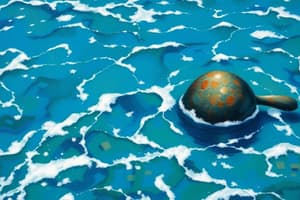Podcast
Questions and Answers
Which process contributes to the salinity of the ocean?
Which process contributes to the salinity of the ocean?
- Advection
- Weathering of rocks (correct)
- Formation of ice
- Evaporation of ocean surface waters
What unit is commonly used to express salinity?
What unit is commonly used to express salinity?
- Grams per liter (g/L)
- Parts per thousand (ppt) (correct)
- Parts per million (ppm)
- Milligrams per liter (mg/L)
Which factor does NOT increase the salinity of the oceans?
Which factor does NOT increase the salinity of the oceans?
- Extraction of freshwater from the ocean (correct)
- Formation of ice
- Advection
- Evaporation from the ocean's surface waters
What can small variations in ocean surface salinity affect?
What can small variations in ocean surface salinity affect?
What salinity value is considered the upper limit for 'brackish water'?
What salinity value is considered the upper limit for 'brackish water'?
Flashcards are hidden until you start studying
Study Notes
Ocean Salinity
- Evaporation of water contributes significantly to ocean salinity by leaving salts behind, thus increasing concentration.
- A commonly used unit to express salinity is practical salinity units (PSU), which reflect the total dissolved salts in seawater.
Factors Affecting Salinity
- Precipitation does NOT increase ocean salinity; rather, it dilutes the salt concentration in seawater.
- Minor variations in ocean surface salinity can affect ocean circulation, marine ecosystems, and climate patterns.
Brackish Water
- Salinity values for brackish water typically range from 0.5 to 30 PSU, with the upper limit being around 10 PSU, indicating a mix of freshwater and seawater.
Studying That Suits You
Use AI to generate personalized quizzes and flashcards to suit your learning preferences.




